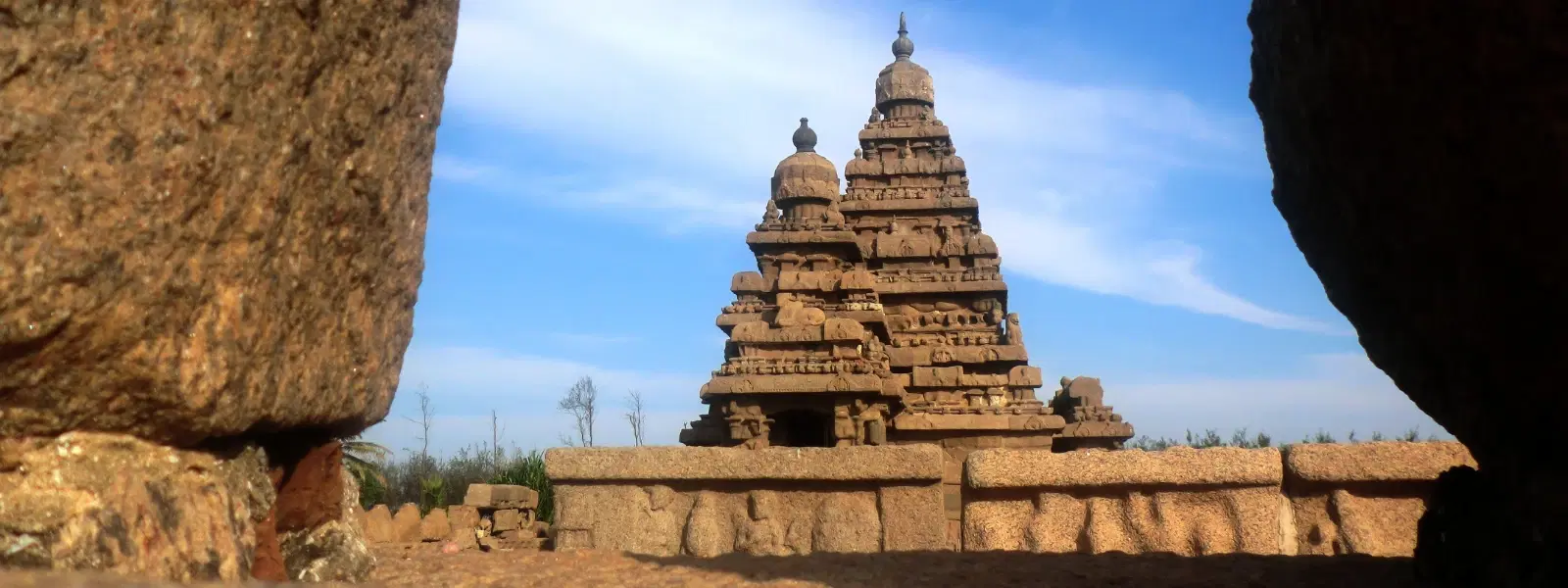
Hotels
•03 min read

The Shore Temple Complex in Mahabalipuram stands as an awe-inspiring UNESCO World Heritage Site, a living testament to South Indian temple art and ancient ingenuity. This blog explores seven fascinating details about this iconic monument, delving into its rich history, unique architectural features, and cultural significance. Readers will gain a deeper understanding of the Shore Temple’s distinctive attributes and discover why it remains a must-visit destination for anyone passionate about history and art.
Constructed during the reign of the Pallava dynasty under King Narasimhavarman II (Rajasimha), the Shore Temple is one of the earliest examples of Dravidian architecture. Its design and structural magnificence not only highlight the technical prowess of ancient builders but also reflect the deep cultural and religious sentiments of the time. As an emblem of history, the temple showcases the artistic and architectural transitions that took place in early South Indian society.
The designation of the Shore Temple as a UNESCO World Heritage Site underscores its importance in preserving South Indian temple art. This recognition ensures that its legacy is maintained for future generations, securing its place as a priceless cultural treasure. The site exemplifies the evolution of architectural styles and stands as a beacon of our rich heritage.
The Shore Temple is celebrated for its unique Dravidian architecture. The temple’s pyramidal structure, with its elegant tiers and intricate layout, faces the Bay of Bengal, creating a stunning juxtaposition between man-made artistry and nature. Crafted mainly from granite, the monument is a vivid reminder of the meticulous skill and advanced engineering techniques employed by ancient artisans.
Adorning the walls of the temple are mesmerizing stone carvings that capture scenes from mythology, nature, and religious lore. Every curve and detailing in these carvings tells a story, from depictions of majestic deities to symbolic representations of flora and fauna, making the temple a treasure trove of artistic heritage.

Did You Know? The Shore Temple is one of the few surviving temples in Tamil Nadu that faces the sea, making it a unique architectural masterpiece of its time.
Inside the temple complex, sculptures of Hindu deities like Lord Shiva and Lord Vishnu command reverence with their timeless grace. These statues are more than just stone figures; they are embodiments of faith and cultural symbolism that continue to inspire both devotees and art enthusiasts alike.
The Shore Temple is rich with symbolic representations that are characteristic of South Indian temple art. Prominent features include the Nandi statues and detailed bas-reliefs that serve to narrate epic tales and spiritual philosophies. Such elements not only enhance the aesthetic appeal of the temple but also facilitate a deeper connection with its religious heritage.
This majestic structure is much more than an architectural marvel; it is a profound spiritual and cultural landmark in Tamil Nadu. For centuries, it has been a hub for pilgrimage and devotion. The temple’s peaceful ambiance and sacred carvings speak volumes about the region’s historical and spiritual journey, inviting visitors to introspect and connect with ancient traditions.
Today, the Shore Temple attracts tourists from all around the world. Its allure lies in its seamless blend of history, art, and natural beauty. As one of the prominent Mahabalipuram tourist attractions, it not only serves as a window into the past but also enriches modern travel experiences by offering insights into the timeless charm of ancient temples in Tamil Nadu.

Ongoing conservation efforts by the Archaeological Survey of India (ASI) ensure that the Shore Temple is preserved against the relentless forces of nature, particularly erosion from the sea. These efforts are critical to maintaining the structural integrity of the monument, allowing future generations to experience its grandeur firsthand.
While the increasing influx of visitors emphasizes the temple's popularity and cultural significance, it also presents challenges in terms of preservation. Striking a balance between accommodating tourism and protecting heritage is paramount. Meticulous planning and ongoing conservation work help ensure that this ancient marvel can be enjoyed without compromising its integrity.
The Shore Temple is special for its Dravidian architecture, its status as one of the earliest stone temples in South India, and its UNESCO World Heritage Site designation.
Visitors typically spend 1-2 hours exploring the temple complex, appreciating its architecture, sculptures, and surrounding attractions.
There is no strict dress code, but visitors are advised to wear modest clothing out of respect for the religious and cultural significance of the site.
In summary, the Shore Temple Complex in Mahabalipuram is a landmark of historical importance, architectural brilliance, and cultural heritage. Its intricate carvings, detailed sculptures, and panoramic setting not only capture the essence of ancient South Indian artistry but also invite modern travelers to delve into a rich narrative that spans centuries. Exploring this monument offers an immersive journey into the legacy of the Pallava dynasty and a deeper appreciation of India's timeless traditions.